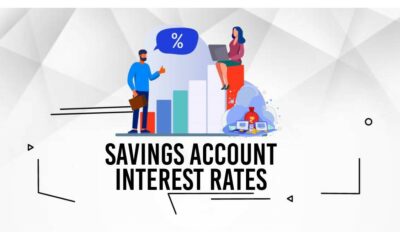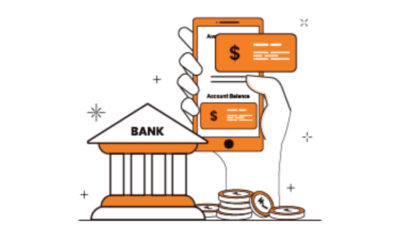Business
How to Earn Bonuses on Your Bank Account

Cash bonuses are a common strategy used by banks and credit unions to entice new depositors and customers. Bonuses can attract customers to a bank at first, and they might even decide to keep the checking or savings account open for a long time. A bank account bonus can be very advantageous to you as a customer, particularly if the requirements are simple and can be fulfilled with little work on your part.
Bonuses for bank accounts typically range from $50 to $500, though bonuses worth thousands of dollars are occasionally offered. We’ll outline five strategies in this post to help you be eligible for and receive bank account bonuses.
How do bank account bonuses work?
Bonuses may be given by banks to customers who open business or personal accounts and fulfill certain criteria. Some banks give referral bonuses to current customers who bring in new ones, in addition to bonuses for those who open new checking or savings accounts.
Depending on the bank, you might need to open an account and complete one or more of the following within a certain amount of time to be eligible for a bonus.
Make a specified number of deposits into the account and keep the balance there. If you have deposited at least $10,000 into the account and maintained it there for 30 days, you may be eligible for the bonus.
Get direct deposits into the account for a predetermined minimum amount. For instance, during the first 120 days, a bank might demand that you receive $4,000 in direct deposits.
Make a minimum amount of purchases with your debit card. For instance, within 60 days of opening the account, you might have to make at least 15 debit card purchases.
It might also be necessary for you to make a fresh deposit into the account to be eligible for a bonus, as opposed to moving money from any other bank accounts you may already have.
How to get bonuses on your bank account
Before you even choose to pursue a bank bonus, it is essential to know exactly what is expected of you. In this manner, you’ll avoid investing time and resources in bonuses that don’t make sense. Additionally, maintaining organization increases the likelihood that you will receive a bonus. Take into account these five general guidelines if you’re thinking about pursuing one or more bank bonuses:
- Know where to look
Maintains an ongoing list of the best bank account bonuses, which includes incentives for opening new business or personal accounts as well as bonuses for bringing in new clients in the form of friends and family. Periodically, local credit unions and banks may also provide bonuses for your account. Advertisements for these bonuses might arrive in the mail, or you could check the websites of your local banks on a regular basis to see if any are available.
- Look for bonuses that you can earn
Look for bank bonuses that have requirements, such as a minimum opening deposit or a minimum amount in direct deposits, that you can easily meet. If a bonus demands a higher initial deposit than you can comfortably afford, for example, you’re probably better off avoiding it completely. Similarly, if you need to keep the money in the account for 120 days but may need to take it out sooner, it is not worthwhile to pursue a bonus.
- Carefully review the T&Cs
Read the terms and conditions carefully before attempting to claim a bonus to make sure there are no restrictions that would make it impossible for you to meet the requirements. Other things to be cautious of are:
- Monthly maintenance fees: Unless you fulfill the requirements to have the fee waived, if an account you’re opening has a monthly maintenance fee, this could deplete your balance. If a fee causes your balance to drop below the daily minimum required to qualify for the bonus, you might even be ineligible for it. Falling below, even for a brief period of time, on one day of a billing cycle may nullify the bonus or incur a charge.
- Early account closure fee: If you intend to close the account after you’ve received the bonus, be aware of any early account closure fees. If a bank charges this kind of fee, it usually ranges from $5 to $50 if the account is closed within 90 days of opening; however, the amount and time frame may vary.
- Hard credit inquiries: Upon your account application, the bank may occasionally run one of these credit checks. Hard credit inquiries can lower credit scores, and an excessive number of them on your credit report may be a sign of increased credit risk.
- Be organized
If you’re aiming for multiple bonuses at once, keeping track of your bonus requirements in a spreadsheet will help you make sure you meet the requirements in the allocated time. Note any early account closure fees and how long the account must remain open to avoid them if you intend to close the account after receiving the bonus.
The following details should be entered into a spreadsheet:
- Name of bank
- Dollar amount of bonus
- Requirements to earn a bonus
- The date the account was opened
- Deadline for requirements to be met
- A date bonus was earned
- The date the bonus was received
- Early account closure fee, if applicable
It can be easier to stay on track to receive the bonus before the deadline if you have all the necessary information in one location. When you register with a new bank, make sure you maintain track of your login credentials.
- Set aside money for taxes
The Internal Revenue Service (IRS) taxes your bank bonus at the same rate that you pay income taxes. You can make sure you’ll have the money you need for taxes by setting aside money for this purpose as soon as you receive the bonus. Your bank might send you a 1099-INT or 1099-MISC form about the bonus as tax season draws near. You are still liable for paying taxes on any bank account bonuses you have received even if you do not receive an IRS form. There is a space on a 1040 form for reporting income from prizes or awards.
Conclusion
If it’s easy to do and doesn’t take a lot of time, earning a bank bonus might be worthwhile. You can make sure you don’t miss the best bonuses for you by knowing where to look for them. Maintaining organization is essential for meeting deadlines for minimum direct deposit amounts or debit card purchases. A careful reading of the fine print and putting aside some cash for taxes are two more strategies to guarantee success.
-

 Business3 weeks ago
Business3 weeks agoPrakash and Kamal Hinduja: Driving Social and Environmental Change
-
Education4 weeks ago
Fred DuVal: University Leadership as a Critical Resource for Climate Change Research and Life-Saving Solutions
-

 Health3 weeks ago
Health3 weeks agoThe Hinduja Brothers Commitment to Global Health: Empowering Communities Across Borders
-

 Cryptocurrency3 weeks ago
Cryptocurrency3 weeks agoDesigned For The Masses: How Akasha (AK1111) Is Unlocking Crypto For The Next Billion Users
-

 Cryptocurrency4 weeks ago
Cryptocurrency4 weeks agoNexaglobal & Future World Token (FWT): Could This Be the Next Big Crypto Investment of 2025?
-

 Sports4 weeks ago
Sports4 weeks agoWomen’s NCAA Tournament 2025 Sweet 16: Full Schedule, Fixtures, Teams, Bracket, and How to Watch March Madness Basketball Match Live
-

 Startup1 week ago
Startup1 week agoCost-Saving Strategies Every Small Business Owner Should Know to Boost Efficiency
-

 Startup3 weeks ago
Startup3 weeks agoMatthew Denegre on the Art of Deal Sourcing: Finding the Right Investment Opportunities

















